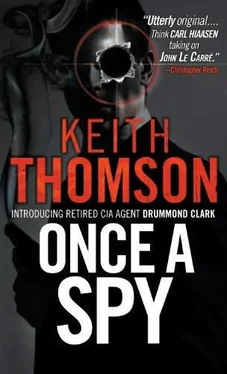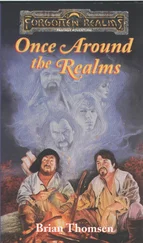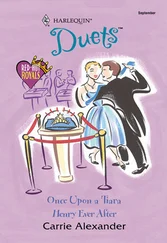Keith Thomson - Once a spy
Здесь есть возможность читать онлайн «Keith Thomson - Once a spy» весь текст электронной книги совершенно бесплатно (целиком полную версию без сокращений). В некоторых случаях можно слушать аудио, скачать через торрент в формате fb2 и присутствует краткое содержание. Жанр: Шпионский детектив, на английском языке. Описание произведения, (предисловие) а так же отзывы посетителей доступны на портале библиотеки ЛибКат.
- Название:Once a spy
- Автор:
- Жанр:
- Год:неизвестен
- ISBN:нет данных
- Рейтинг книги:5 / 5. Голосов: 1
-
Избранное:Добавить в избранное
- Отзывы:
-
Ваша оценка:
- 100
- 1
- 2
- 3
- 4
- 5
Once a spy: краткое содержание, описание и аннотация
Предлагаем к чтению аннотацию, описание, краткое содержание или предисловие (зависит от того, что написал сам автор книги «Once a spy»). Если вы не нашли необходимую информацию о книге — напишите в комментариях, мы постараемся отыскать её.
Once a spy — читать онлайн бесплатно полную книгу (весь текст) целиком
Ниже представлен текст книги, разбитый по страницам. Система сохранения места последней прочитанной страницы, позволяет с удобством читать онлайн бесплатно книгу «Once a spy», без необходимости каждый раз заново искать на чём Вы остановились. Поставьте закладку, и сможете в любой момент перейти на страницу, на которой закончили чтение.
Интервал:
Закладка:
“Gracious, this is the fourth medevac this week,” she said against the ruckus. “We’d best get inside while we still have our hearing.”
She started toward the portico. Charlie went to fetch Drummond. The helicopter aimed for the far tennis court, the one Drummond had been watching. Charlie noticed for the first time that it had no net. Unease coated him.
“You think it’s them?” he had to shout.
“No,” Drummond said. He stared with childlike fascination at the swirl of grass and leaves caused by the helicopter’s descent.
Charlie wasn’t at all assured.
The helicopter’s skids touched the court, and two paramedics jumped from the cabin. Shimmering with each rotation of the main rotor, they slid out a gurney bearing an unresponsive patient. The first paramedic was a diminutive brunette, no more than twenty-five. The other was a weary-eyed Hispanic man in his early fifties. They unfolded the legs and wheels from beneath the gurney with a synchronization and fluidity of thousands of repetitions, which comforted Charlie.
But how about the patient? Probably around fifty, he had gray hair and an athletic build. His face was largely veiled by an oxygen mask, dark glasses, and the brim of his fishing hat.
The tumult now made it impossible even to shout to Drummond. Charlie tugged at his elbow and gestured with urgency toward the portico.
13
With Drummond in tow, Charlie followed Isadora through a monolithic bronze door into the clubhouse’s cathedral-sized entry hall. Cloaked in elegant gray velvet curtains, three-story windows admitted only stray particles of daylight. The floor was a pool of black marble. As Charlie’s eyes acclimated, trophies sprang from the dark mahogany walls-a lion, a boar, a herd of antlered animals, and an elephant with tusks big enough to bracket a car. Breathing in the bouquet of cigars and old leather, Charlie reflected that at least the Bond movies got the locations right.
As large as the entry hall was, it was hushed. The hiss of Isadora’s rubber wheels reverberated into a shriek. “Let’s go to the tea parlor, it’s a bit cozier,” she whispered-any louder, it seemed, and the echo might loosen bits of ceiling.
The tea parlor was indeed cozy compared to the entry hall; still it was as large a room as Charlie ever had been in that wasn’t public. Fluted columns sustained a high ceiling and framed ten bays, each adorned with hand-painted battle scenes. Friezes repeated in half-moons over the doors and over a stone fireplace almost as big as his bedroom. A waiter wheeled an antique silver trolley, laden with tea and pastries, to “club members,” as Isadora referred to the casually dressed men and women, all in their gray years. The members occupied about ten of the fifty or so tapestry-upholstered sofas and chairs. The quantity of muffled reports from the other end of the clubhouse suggested that pistols and trap shooting were much more popular at the “club” than tea.
“Charles, I may have rushed to judge assisted-living facilities,” Drummond said. “Is this Holiday Ranch?”
“This is the Monroeville club, Drummond,” Isadora said. “You’ve visited several times before.” He looked at her as if she were a mile away. “It’s a residence for injured and retired intelligence officers, and it serves as a medical facility in a pinch, when an injury treated at Bethesda Naval or Hopkins might make unwanted headlines or, worse, enemy intelligence.”
“Yes, yes, of course,” he said.
But he appeared confused. He even walked with uncertainty, as if a misstep might trip a mine.
“Why don’t you sit, dear?” She pointed him to a sofa.
He let himself fall into it. At once, his head toppled to his shoulder and he began to snore lightly. She seemed relieved.
Charlie noticed that Drummond’s fly was halfway down. “Any chance there’s a room for him here?” he asked Isadora.
“I’m sure he’d say that this place isn’t big enough for the two of us. But hopefully he can be assigned to another club once we get to the bottom of our inquiry.” She waved Charlie into the adjacent chair and pulled up beside him. “Now, where was I?”
“About to die.”
“Right.” She laughed. “Officially, I was the second assistant secretary at the embassy. Really, I went to Moscow to run Nikolay Trepashkin, a Federal Assembly member notorious for chasing American skirts. The idea was he’d point me to a mole we suspected the KGB had in Washington, then I’d come home to you. But trouble arose with what should have been the simplest part. Usually when Trepashkin had a message for me, he wedged it behind the sink in the men’s room of a drab little bar off Pushkin Square.”
“You went into the men’s room to get it?”
“Actually, he signaled it was there by moving a flowerpot to one side of his windowsill. At that point a male cutout-that’s a messenger who knows as little as possible about the works-retrieved the document and loaded it into another dead drop, a slot behind a loose brick in a playground wall. Then another cutout took it to the desk of a busy hotel on the Donskaya and sent it to the embassy in the guise of junk mail.”
“It wouldn’t have been easier to send it straight to you?”
“The short answer is no; the other team was too resourceful. On my last day in Moscow, Trepashkin had a document important enough that he signaled for a face-to-face. I procured a bland Zhiguli and parked on a busy block-cars are good for meetings on short notice because the space is small, controllable, and two people in a car don’t arouse suspicion. But he didn’t conduct adequate countersurveillance, and the other team ordered a ‘discontinuation of his existence,’ as they liked to call it. Their gunmen drove by and obliterated my car while he was getting in. He died while saying, ‘Hi.’ When they doubled back to get his attache case, they took me for dead too. As you’ve probably surmised, they were wrong. The director decided to make it appear I had died, though. I was exfiltrated in a casket; the agency even dug a grave and put up a tombstone beside my parents’ in Billings. The reason is, in the time between the shooting and the gunmen’s return, I’d peeked into Trepashkin’s attache case and learned who the mole was. But the director wanted the Ivans to think we’d learned nothing, so that they would leave their man in place and we could play him. For years, we succeeded, with one enormous exception: I couldn’t see you. I did keep tabs on you, and I longed to see you. Probably that’s why, when the Social Security Administration exposed a facet of my cover that the agency had failed to take into account, I went against my better judgment and had the checks forwarded to you. My rationale was the money might come in handy, and perhaps, in some infinitesimal way, allow you to feel your mother’s love.”
Charlie wanted to feel it. But her story wasn’t quite adding up. “The mole must be collecting Social Security himself by now,” he said.
“He died four years ago. Natural causes, of all things.”
So why, Charlie wondered, had she remained out of touch?
As if having read his thoughts, she said, “Unfortunately my resurfacing still opens the national security equivalent of Pandora’s box. All that I’m allowed to say in that regard is, I’m working on it. When I was notified that you were here, I pleaded for the opportunity to tell you the little I’ve told you. I’m glad we had this time. Unfortunately it came at a cost.”
She peeled the woolen blanket from her lap, revealing a pistol. She took it up by its bulky grip, aiming in the general area of Charlie and Drummond.
Two or three of the other members looked over. They regarded the weapon no differently than if it were a teacup.
Читать дальшеИнтервал:
Закладка:
Похожие книги на «Once a spy»
Представляем Вашему вниманию похожие книги на «Once a spy» списком для выбора. Мы отобрали схожую по названию и смыслу литературу в надежде предоставить читателям больше вариантов отыскать новые, интересные, ещё непрочитанные произведения.
Обсуждение, отзывы о книге «Once a spy» и просто собственные мнения читателей. Оставьте ваши комментарии, напишите, что Вы думаете о произведении, его смысле или главных героях. Укажите что конкретно понравилось, а что нет, и почему Вы так считаете.












